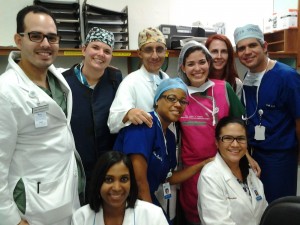Education | Dominican Republic Heart Mission
Learning about, caring for the diseases of poverty

UVA Cardiovascular team with physicians from CEDIMAT Medical Center in Dominican Republic.
The University of Virginia Cardiovascular Fellowship program, in collaboration with the CEDIMAT Medical Center in Santo Domingo, Dominican Republic (DR), has an ongoing humanitarian initiative that provides free treatment for mitral valve stenosis to hundreds of people a year who would otherwise not receive medical attention – and gives UVA cardiology fellows a unique opportunity to learn about and treat this condition and other diseases of poverty in an international setting.
Rheumatic fever is a potential sequela of strep infection; in the U.S. and other developed countries, where strep is typically treated with antibiotics, rheumatic fever is relatively rare. That’s not the case in poorer countries, however, where it remains a major cause of morbidity and premature death, and imposes a substantial burden on struggling healthcare systems. Rheumatic fever can result in scarring of the heart’s mitral valve; this, in turn, causes mitral stenosis – a narrowing of the mitral valve that prevents it from opening properly and impedes the flow of blood to the heart. If left untreated, it can lead to serious heart complications.
With a grant from the Edwards Lifesciences Fund, Cardiovascular faculty member Scott Lim established the DR program in 2008 with a twofold mission: to provide an intensive educational experience for cardiology fellows in the diagnosis and treatment of rheumatic heart disease, and free clinical care for patients in desperate need of treatment. It also gives UVA faculty a chance to share their expertise with physician-colleagues at CEDIMAT. The UVA group includes faculty specialists in noninvasive and interventional cardiology, along with fellows from both disciplines; they work together with DR cardiology teams in several field clinics to screen clients and provide life-saving therapy.
Participating fellows are provided with transportation, lodging, and an unusually satisfying educational opportunity. In return, they make a commitment to provide charity care for other impoverished rheumatic heart disease patients, and to repay the program’s investment in their training within five years of graduation.
